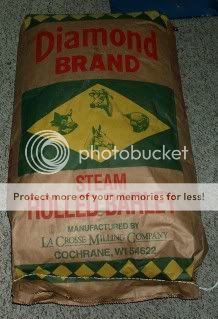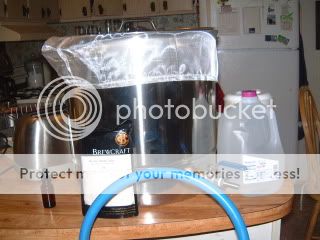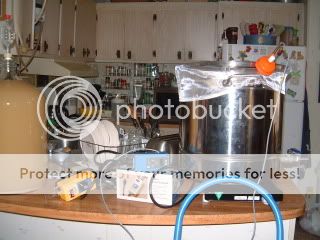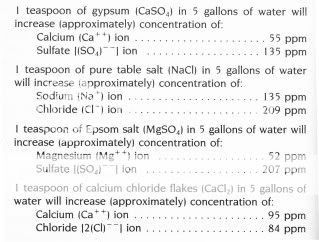
NOTE: This forum is no longer active. This is an archive copy of the forum as it was on 10 March 2018.
finally purchased grain
71 posts •
Page 1 of 3
•
1, 2, 3
finally purchased grain
i just bought 50 pounds/22.68 kilos of rolled barley. i will
have detailed photos when i actually get to the production. One
more day to get the vodka wash out of the fermenter bucket


still searching for the knowledge
- scotty
- Rundlet Cask
- Posts: 186
- Joined: Sun Oct 31, 2010 1:15 pm
- Location: FLORIDA U.S.A.
Re: finally purchased grain
i have the 15 gallon pot ready also 12 gallons of distilled
water to be treated to emulate water from burton on the trent

the cart contains all ingredients plus scales and measuring devices

here is the intended proceedure
IRISH ((( STYLE )))) WHISKEY
EQUIPMENT. —ALPHA and —BETA AMYLASE—
2 ZIP LOCK BAGS --Ph meter-BURTON WATER SALTS-citric acid-DAP- formulated yeast energizer- yeast nutrient-yeast hulls- 2 pks. 1118 yeast – 2-liter beaker ––temperature control thermo well --- 1-15 gallon stainless mash pot and 10 gallon plastic fomenter — THERMOWELL --HOTPLATE AND ROUTER CONTROL
1 air lock 1 bung- 1-- 7 GALLON CARBOY-- siphon tube and hose —((butter muslin and rubber band to cover the fomenter))-- – the long stirrer –16.5 POUNDS OF FLAKED BARLEY the 40 pound scals-the gunpowder scale--—(triple scale hydrometer) and a Brix refractometer,
The aeration pump and stone—1 plastic pitcher, ½ gallon size—1 gallon jar for yeast starter
Don’t forget to get distilled water and treat with Burton salts—12 gallons
100% flaked barley
FOR AN 8 GALLON MASH WE WANT 16.5 POUNDS OF GRAIN
16.5 pounds of flaked barley
NOTE--Have 7 gallons of treated water at room temp in the pot before adding the grain.
NOTE-HAVE ANOTHER 5 GALLONS READY HEATED TO 145 DEGREES F.
NOTE: A STANDARD AMOUNT OF WATER FOR DOUGH IN is 24 to 40 ounces of 58 degree F. ( (basically tap water)) Water to a pound of grain. Prox. 1 to 1.5 qts. of water per pound
NOTE: -ADD GRAIN TO ROOM TEMP WATER
Mash in--bring water and grain mix to 95 deg. F.
Water should hold to 94-100 F--hold for 60 min. ((ph should be dropping)) Re test ph
NEXT--slowly raise temp. to 122 deg F. -- hold 30 minutes- pectin and adjuncts are breaking down
Always stir grain just enough to avoid lumping while slowly raising the temperature to
145 deg. F. and allow 15 minutes for gelatinizing-
Bring water to 145 degrees and add BOTH amylases
.060grams of each per pound of grain
.06*16.5 = .99 grams each of alpha and beta amylase
Add both amylases and mash at 145 degrees for 90 minutes
DO AN IODINE TEST—MAS 30 MIN LONGER AND TEST AGAIN
POUR4 PITCHERS OF WATER FROM TUN OVEER TOP OF GRAIN
DRAIN 7.5 GALLONS OF CLEAR WORT TO FORMENTER
We ferment by standard wash procedures
Clear wash and store with sorbate and sulfate
MAKE AT LEAST 2 MORE BATCHES to use the 50-pound bag
Clear, sorbate, sulfite and store to run later
Fermentation method
NAME OF YEAST=_ec1118 USE 2 PACKETS-use 1 gallon glass jar for starter bottle
(((( make the wort nd start the starter bottle at the same time))))
SEE STARTER BOTTLE METHOD IN 8D thru 8H---(((make the wort and use it to make the starter bottle.—now add sulfite to protect the wort until the 24 hours for the starter bottle have passed)))
((Wort must have the additives mixed in it already))
STARTER BOTTLE NEW METHOD—1 TSP OF SUGAR AT FIRST -rehydrate the yeast in one cup of SUGAR water for 15 minutes then add diluted wort
D-- NOW Make THE starter bottle 1 liter wort & 1 liter TREATED water.
AERATE FOR 15 minutes before adding the yeast packs.
(((((DON’T FORGET TO SULFITE THE WORT AFTER GETTING THE STARTER BOTTLE GOING)))))
This will protect the wort while the starter bottle is going for 24 hours.
F--AFTER hydrated yeast has been added to the starter bottle , Then allow 24 hours to multiply—yeast splits every 2 to 4 hours.
My calculations are based on a probable 1.5 hours lag time and about 30 yeast splits
G--Aerate wort for 1 hour during the last hour of rehydrating the yeast in the starter bottle
NOTE: -- DO NOT FORGET TO KEEP RECORDS
H-- Pitch the starter bottle, stir and cover wort
NOTE: INSTALL THE TEMPERATURE COMPENSATING EQUIPMENT MIN 65 DEG.F. IF IN WINTER TIME ONLY.
I--Stir often--at least 3 times a day for the first 2 days
REGARDING TESTS—ALWAYS make and enter all TESTS BEFORE modifying wort.
STIRRING RECORD--DAY#1 XX -MAKE ALL NOTES ON ATTACHED CHART only

the cart contains all ingredients plus scales and measuring devices

here is the intended proceedure
IRISH ((( STYLE )))) WHISKEY
EQUIPMENT. —ALPHA and —BETA AMYLASE—
2 ZIP LOCK BAGS --Ph meter-BURTON WATER SALTS-citric acid-DAP- formulated yeast energizer- yeast nutrient-yeast hulls- 2 pks. 1118 yeast – 2-liter beaker ––temperature control thermo well --- 1-15 gallon stainless mash pot and 10 gallon plastic fomenter — THERMOWELL --HOTPLATE AND ROUTER CONTROL
1 air lock 1 bung- 1-- 7 GALLON CARBOY-- siphon tube and hose —((butter muslin and rubber band to cover the fomenter))-- – the long stirrer –16.5 POUNDS OF FLAKED BARLEY the 40 pound scals-the gunpowder scale--—(triple scale hydrometer) and a Brix refractometer,
The aeration pump and stone—1 plastic pitcher, ½ gallon size—1 gallon jar for yeast starter
Don’t forget to get distilled water and treat with Burton salts—12 gallons
100% flaked barley
FOR AN 8 GALLON MASH WE WANT 16.5 POUNDS OF GRAIN
16.5 pounds of flaked barley
NOTE--Have 7 gallons of treated water at room temp in the pot before adding the grain.
NOTE-HAVE ANOTHER 5 GALLONS READY HEATED TO 145 DEGREES F.
NOTE: A STANDARD AMOUNT OF WATER FOR DOUGH IN is 24 to 40 ounces of 58 degree F. ( (basically tap water)) Water to a pound of grain. Prox. 1 to 1.5 qts. of water per pound
NOTE: -ADD GRAIN TO ROOM TEMP WATER
Mash in--bring water and grain mix to 95 deg. F.
Water should hold to 94-100 F--hold for 60 min. ((ph should be dropping)) Re test ph
NEXT--slowly raise temp. to 122 deg F. -- hold 30 minutes- pectin and adjuncts are breaking down
Always stir grain just enough to avoid lumping while slowly raising the temperature to
145 deg. F. and allow 15 minutes for gelatinizing-
Bring water to 145 degrees and add BOTH amylases
.060grams of each per pound of grain
.06*16.5 = .99 grams each of alpha and beta amylase
Add both amylases and mash at 145 degrees for 90 minutes
DO AN IODINE TEST—MAS 30 MIN LONGER AND TEST AGAIN
POUR4 PITCHERS OF WATER FROM TUN OVEER TOP OF GRAIN
DRAIN 7.5 GALLONS OF CLEAR WORT TO FORMENTER
We ferment by standard wash procedures
Clear wash and store with sorbate and sulfate
MAKE AT LEAST 2 MORE BATCHES to use the 50-pound bag
Clear, sorbate, sulfite and store to run later
Fermentation method
NAME OF YEAST=_ec1118 USE 2 PACKETS-use 1 gallon glass jar for starter bottle
(((( make the wort nd start the starter bottle at the same time))))
SEE STARTER BOTTLE METHOD IN 8D thru 8H---(((make the wort and use it to make the starter bottle.—now add sulfite to protect the wort until the 24 hours for the starter bottle have passed)))
((Wort must have the additives mixed in it already))
STARTER BOTTLE NEW METHOD—1 TSP OF SUGAR AT FIRST -rehydrate the yeast in one cup of SUGAR water for 15 minutes then add diluted wort
D-- NOW Make THE starter bottle 1 liter wort & 1 liter TREATED water.
AERATE FOR 15 minutes before adding the yeast packs.
(((((DON’T FORGET TO SULFITE THE WORT AFTER GETTING THE STARTER BOTTLE GOING)))))
This will protect the wort while the starter bottle is going for 24 hours.
F--AFTER hydrated yeast has been added to the starter bottle , Then allow 24 hours to multiply—yeast splits every 2 to 4 hours.
My calculations are based on a probable 1.5 hours lag time and about 30 yeast splits
G--Aerate wort for 1 hour during the last hour of rehydrating the yeast in the starter bottle
NOTE: -- DO NOT FORGET TO KEEP RECORDS
H-- Pitch the starter bottle, stir and cover wort
NOTE: INSTALL THE TEMPERATURE COMPENSATING EQUIPMENT MIN 65 DEG.F. IF IN WINTER TIME ONLY.
I--Stir often--at least 3 times a day for the first 2 days
REGARDING TESTS—ALWAYS make and enter all TESTS BEFORE modifying wort.
STIRRING RECORD--DAY#1 XX -MAKE ALL NOTES ON ATTACHED CHART only
still searching for the knowledge
- scotty
- Rundlet Cask
- Posts: 186
- Joined: Sun Oct 31, 2010 1:15 pm
- Location: FLORIDA U.S.A.
Re: finally purchased grain
I notice that the amylase is added as an ingredient, rather than
coming from malted barley as it would in Irish whiskey. Not
having any malt in the mix must have a big influence on flavour.
It's a very interesting experiment. I guess none of the rest of
us has tried a 100% unmalted barley whiskey but I'm sure we
would all love to.
Please keep posting your progress. It's very inspiring and educational!
Please keep posting your progress. It's very inspiring and educational!
-

DavidH - Fully mature Cask
- Posts: 1280
- Joined: Tue Mar 17, 2009 7:49 pm
- Location: Dublin
Re: finally purchased grain
DavidH wrote:I notice that the amylase is added as an ingredient, rather than coming from malted barley as it would in Irish whiskey. Not having any malt in the mix must have a big influence on flavour. It's a very interesting experiment. I guess none of the rest of us has tried a 100% unmalted barley whiskey but I'm sure we would all love to.
Please keep posting your progress. It's very inspiring and educational!
Your comment is a point of interest David. I sincerely thank you for bringing this point of concern up.
I'm hoping that malted and unmaltedbarley is still the same wher flavor is concerned
My reasoning is that since a malt is any grain that has been put through the malting process to activate the enzymes,; i am guessing that it wont make any diference in the end result if i use the amylases . Just guessing/hoping too.
My thought is to introduce the amylases at the compromise temperature of 145degF/62.77C that i will leave enough unfermentables to properly emulate the flavour.
Last edited by
scotty
on Fri Jun 10, 2011 3:02 pm, edited 2 times in total.
still searching for the knowledge
- scotty
- Rundlet Cask
- Posts: 186
- Joined: Sun Oct 31, 2010 1:15 pm
- Location: FLORIDA U.S.A.
Re: finally purchased grain
"Please keep posting your progress. It's very inspiring and
educational!"
Dave, I am hoping to get input from many folks on any part of this project. 17.00 for 50 pounds /22.73 kilos
(( of flaked barley)) is a far cry from the over 100 us dollars for 50 pounds if i go to the supplier or have the already malted grain shipped to me. The grain is $45 the shipping is $50 or the cost of petrol is $50 then a half day out always finds us in a resturant since the supplyer is near BUSH GARDENS AMUSEMENT PARK.
Another area of concern is emulating the water of Ireland. All i can find is this burton on the trent salts. I dont know what else to do. I will treat distilled water with the salts.
I dont know enough about water to do better. I wish there was a way to learn more.
Dave, I am hoping to get input from many folks on any part of this project. 17.00 for 50 pounds /22.73 kilos
(( of flaked barley)) is a far cry from the over 100 us dollars for 50 pounds if i go to the supplier or have the already malted grain shipped to me. The grain is $45 the shipping is $50 or the cost of petrol is $50 then a half day out always finds us in a resturant since the supplyer is near BUSH GARDENS AMUSEMENT PARK.
Another area of concern is emulating the water of Ireland. All i can find is this burton on the trent salts. I dont know what else to do. I will treat distilled water with the salts.
I dont know enough about water to do better. I wish there was a way to learn more.
still searching for the knowledge
- scotty
- Rundlet Cask
- Posts: 186
- Joined: Sun Oct 31, 2010 1:15 pm
- Location: FLORIDA U.S.A.
Re: finally purchased grain
scotty wrote: Your comment is a point of interest David. I sincerely thank you for bringing this point of concern up.
I'm hoping that malted and unmaltedbarley is still the same wher flavor is concerned
The use of a high proportion of unmalted barley is what distinguishes Irish pot still whiskey from malt whiskey. They taste different so I'm assuming that is due to the proportion of malt. Malt is also a flavour in non-alcoholic drinks and foods (for example, Maltesers), I think.
I'm just speculating here. You know more about this process than I do. And even if there is a taste difference it's still worth trying. You might invent a great new whiskey!
-

DavidH - Fully mature Cask
- Posts: 1280
- Joined: Tue Mar 17, 2009 7:49 pm
- Location: Dublin
Re: finally purchased grain
scotty wrote:Another area of concern is emulating the water of Ireland. All i can find is this burton on the trent salts. I dont know what else to do. I will treat distilled water with the salts.
One Irish distiller has said to me that they don't want hard water because it causes scaling inside the copper pot stills. Perhaps you would be closer using just distilled water.
-

DavidH - Fully mature Cask
- Posts: 1280
- Joined: Tue Mar 17, 2009 7:49 pm
- Location: Dublin
Re: finally purchased grain

yelow gizz is router speed control to control applied voltage. blue gizz is thermostat to turn the black 1500 watt hotplate on and off automatically to maintain a desired temperature(the thermostat is set with a 1degree diferential) we change the desired temperatur as we proceed with the mashing conversion.
controlling the applied voltage allows me to change the heat output of the hotplate to an infinite amount of wattages
Click to add
.
.
Last edited by
scotty
on Sat Jun 11, 2011 3:31 pm, edited 1 time in total.
still searching for the knowledge
- scotty
- Rundlet Cask
- Posts: 186
- Joined: Sun Oct 31, 2010 1:15 pm
- Location: FLORIDA U.S.A.
Re: finally purchased grain
I'm still researching WATER IN IRELAND ill bet some distillers
use a well and others the town water supply. Ill keep
looking.
BTW my still is completly stainless steel but i use copper mesh in the tower to address the sulpher problem. copper stills dont need copper added.
BTW my still is completly stainless steel but i use copper mesh in the tower to address the sulpher problem. copper stills dont need copper added.
still searching for the knowledge
- scotty
- Rundlet Cask
- Posts: 186
- Joined: Sun Oct 31, 2010 1:15 pm
- Location: FLORIDA U.S.A.
Re: finally purchased grain
DavidH wrote:scotty wrote: Your comment is a point of interest David. I sincerely thank you for bringing this point of concern up.
I'm hoping that malted and unmaltedbarley is still the same wher flavor is concerned
The use of a high proportion of unmalted barley is what distinguishes Irish pot still whiskey from malt whiskey. They taste different so I'm assuming that is due to the proportion of malt. Malt is also a flavour in non-alcoholic drinks and foods (for example, Maltesers), I think.
I'm just speculating here. You know more about this process than I do. And even if there is a taste difference it's still worth trying. You might invent a great new whiskey!
You mention the diference in flavor-- so are you telling me that a 100% malt does taste diferent from where only a portion of malst is used as needed to make the conversion of starch to sugar.
Asyou know i rely on input from folks who know the diferences.
i have succeeded in a mock burbon but i really want to emulate irish whiskey. i may in the end have to spend the money for the malt
still searching for the knowledge
- scotty
- Rundlet Cask
- Posts: 186
- Joined: Sun Oct 31, 2010 1:15 pm
- Location: FLORIDA U.S.A.
Re: finally purchased grain
scotty wrote:You mention the diference in flavor-- so are you telling me that a 100% malt does taste diferent from where only a portion of malst is used as needed to make the conversion of starch to sugar.
Right. A good example, perhaps, is Writers Tears whiskey. That's a blend of both malt and pot still whiskeys made in the same distillery. There would be no point doing that if malt and pot still tasted the same.
-

DavidH - Fully mature Cask
- Posts: 1280
- Joined: Tue Mar 17, 2009 7:49 pm
- Location: Dublin
Re: finally purchased grain
I see what you are saying. wELL I GUESS MY QUETS WILL HAVE TO
WAIT TILL I HAVE ANOTHER REASON TO DRIVE TO TAMPA TO GET SOME
MALT.
BTW Dave, I really appreciate the help
\ Just wondering if pot still whiskey is used because it is cheaper to make??
BTW Dave, I really appreciate the help
\ Just wondering if pot still whiskey is used because it is cheaper to make??
still searching for the knowledge
- scotty
- Rundlet Cask
- Posts: 186
- Joined: Sun Oct 31, 2010 1:15 pm
- Location: FLORIDA U.S.A.
Re: finally purchased grain
scotty wrote:Just wondering if pot still whiskey is used because it is cheaper to make??
You are right, historically
-

DavidH - Fully mature Cask
- Posts: 1280
- Joined: Tue Mar 17, 2009 7:49 pm
- Location: Dublin
Re: finally purchased grain
Hi Scotty,
Following your progress with interest and envy you the fact that you can boil away to create your own concoctions while we over here are banned by law doing such
Anyway keep the posts going we are reading.
Just a quick observation on this ...
Firstly in relation to Scotch and Irish whiskey malt is a specific reference to Malted Barley only. No other grain is malted in the use of these whiskies. That's just for you information.
In the use of solely plain barley and then amyless ... sure why not. I'd give it a go but if you want to make sure your on the righteous path I suppose the use of Malted Barley is the way to go but do you need to be putting all that extra expense on yourself.
One of the big differences between bourbon, Irish & Scotch is how they are matured. In the US whiskey states ye have very hot summers and very cold winters compared to us over here. So there is huge deep interaction with the wood and US whiksey matures quicker and takes on much more flavour from the wood. And the fact ye use first use oak makes a huge difference too.
Over this side of the pond we use oak that already has been used to mature Bourbon so the wood is not as dominant as the bourbon has already taken out a lot of the dominant oak flavours. So the flavours take longer to extract for iriah and Scotch.
But with the different climate over here this plays a key part also.
In Scotland they have Mild Summers and very Cold winters. This means the whisky takes longer to mature which suits the stronger flavours of alot of the scotch distilleries.
In Ireland we have Mild Summers and Mild Winters. This causes a slightly quick maturation than scotland but mellows out the whiskey more.
So even if you have recreated the whiskey spirit spot on your maturation may be a key factor in getting it right or not. If you have a basement under the house it may be a way to go instead of using an out shed. Basically you'll want somewhere that is cool all year round.
Following your progress with interest and envy you the fact that you can boil away to create your own concoctions while we over here are banned by law doing such
Anyway keep the posts going we are reading.
Just a quick observation on this ...
scotty wrote:My reasoning is that since a malt is any grain that has been put through the malting process to activate the enzymes,; i am guessing that it wont make any difference in the end result if i use the amylases . Just guessing/hoping too.
Firstly in relation to Scotch and Irish whiskey malt is a specific reference to Malted Barley only. No other grain is malted in the use of these whiskies. That's just for you information.
In the use of solely plain barley and then amyless ... sure why not. I'd give it a go but if you want to make sure your on the righteous path I suppose the use of Malted Barley is the way to go but do you need to be putting all that extra expense on yourself.
One of the big differences between bourbon, Irish & Scotch is how they are matured. In the US whiskey states ye have very hot summers and very cold winters compared to us over here. So there is huge deep interaction with the wood and US whiksey matures quicker and takes on much more flavour from the wood. And the fact ye use first use oak makes a huge difference too.
Over this side of the pond we use oak that already has been used to mature Bourbon so the wood is not as dominant as the bourbon has already taken out a lot of the dominant oak flavours. So the flavours take longer to extract for iriah and Scotch.
But with the different climate over here this plays a key part also.
In Scotland they have Mild Summers and very Cold winters. This means the whisky takes longer to mature which suits the stronger flavours of alot of the scotch distilleries.
In Ireland we have Mild Summers and Mild Winters. This causes a slightly quick maturation than scotland but mellows out the whiskey more.
So even if you have recreated the whiskey spirit spot on your maturation may be a key factor in getting it right or not. If you have a basement under the house it may be a way to go instead of using an out shed. Basically you'll want somewhere that is cool all year round.
Sláinte Adrian
- IrishWhiskeyChaser
- Site Admin
- Posts: 2910
- Joined: Tue Mar 17, 2009 1:37 pm
- Location: A Dark Dunnage somewhere in Galway
Re: finally purchased grain
Thank you so much.
I will save this thread as i do with the other info that has been fed to me. Dave gave me thoughts on the water item. the burton salts are definitely out.
ifound a chart in Papazianz book about beer that gives the profile of waters in countrys where famous beers are made.
The water in Ireland is yards softr than the burton water so at this point the plain distilled looks best. I will compare the profiles and consider doing just a fractional dose of the burton salts.
I will post the chrt as soon as i get it scanned.
I cant tell you folk how much your input has added to my desire to try and come close to making an Irish style ofwhiskey. perhaps i should change my last name from Scotto to McScotto
I will save this thread as i do with the other info that has been fed to me. Dave gave me thoughts on the water item. the burton salts are definitely out.
ifound a chart in Papazianz book about beer that gives the profile of waters in countrys where famous beers are made.
The water in Ireland is yards softr than the burton water so at this point the plain distilled looks best. I will compare the profiles and consider doing just a fractional dose of the burton salts.
I will post the chrt as soon as i get it scanned.
I cant tell you folk how much your input has added to my desire to try and come close to making an Irish style ofwhiskey. perhaps i should change my last name from Scotto to McScotto
still searching for the knowledge
- scotty
- Rundlet Cask
- Posts: 186
- Joined: Sun Oct 31, 2010 1:15 pm
- Location: FLORIDA U.S.A.
Re: finally purchased grain
I forgot to add that i will only be using barley.. Now i suposu
it will be necessary for me to eventually get a bag of barley
malt and make a run with which to compare the two

Whats a roundlet cask- I was just gettin used to playing with a half deck
Whats a roundlet cask- I was just gettin used to playing with a half deck
still searching for the knowledge
- scotty
- Rundlet Cask
- Posts: 186
- Joined: Sun Oct 31, 2010 1:15 pm
- Location: FLORIDA U.S.A.
Re: finally purchased grain
DavidH wrote:scotty wrote:Just wondering if pot still whiskey is used because it is cheaper to make??
You are right, historicallyThe British government imposed a tax on malt so Irish distillers replaced some of the malt with barley. The malt tax lasted until near the end of the 19th century. Distillers did not change back to all-malt when the tax was removed, however, because by that time "pure pot still" had become the accepted Irish style.
So should this batch with the unmalted barley be called pot still whiskey-- i dont mind a bit if thats the case--i just want some aythentecity in all my productions. I will just wait till the $ for the 100% malt is available then get to the real McCoy.
still searching for the knowledge
- scotty
- Rundlet Cask
- Posts: 186
- Joined: Sun Oct 31, 2010 1:15 pm
- Location: FLORIDA U.S.A.
Re: finally purchased grain


sorry for the poor definition. i will attempt to re scan, enlarge and darken the first image.
still searching for the knowledge
- scotty
- Rundlet Cask
- Posts: 186
- Joined: Sun Oct 31, 2010 1:15 pm
- Location: FLORIDA U.S.A.
Re: finally purchased grain
dublin---------- burton-on-trent
----------------------------------------------------------------------------------------------------
calcium 115-120 ------- 260-352
----------------------------------------------------------------------------------------------------
sulfates 54 ------- 630-820
----------------------------------------------------------------------------------------------------
magnesium 4 ------- 24-60
----------------------------------------------------------------------------------------------------
sodium 12 ------- 54
----------------------------------------------------------------------------------------------------
chloride 19 ------- 16-36
THESE FIGURES ARE PARTS PER MILLION SOMETHING i think/ liter
i think/ liter
I retyped the dublin and burton figures now i will try to learn if i can buy apackage to emulate Dublin water.
----------------------------------------------------------------------------------------------------
calcium 115-120 ------- 260-352
----------------------------------------------------------------------------------------------------
sulfates 54 ------- 630-820
----------------------------------------------------------------------------------------------------
magnesium 4 ------- 24-60
----------------------------------------------------------------------------------------------------
sodium 12 ------- 54
----------------------------------------------------------------------------------------------------
chloride 19 ------- 16-36
THESE FIGURES ARE PARTS PER MILLION SOMETHING
I retyped the dublin and burton figures now i will try to learn if i can buy apackage to emulate Dublin water.
Last edited by
scotty
on Tue Jun 14, 2011 1:35 pm, edited 3 times in total.
still searching for the knowledge
- scotty
- Rundlet Cask
- Posts: 186
- Joined: Sun Oct 31, 2010 1:15 pm
- Location: FLORIDA U.S.A.
Re: finally purchased grain
Look what i found-- its closer than nothing and i dont know
which one is correct any way--
http://www.thegrape.net/search.htm?sear ... y=0&step=2
I will use the salts for the Irish style whiskey and also for this batch of POTEEN/irish moonshine that i am making soon. i will do up a diferent set of instructions for the poteen aand make a label callin it just that.
poteen
IRISH MOONSHINE
ANY OTHER SUGGESTIONS??
I'm asuming that the aging problem should only be for the whiskey.
One question that i still have is that I wonder of the POTEEN needs tripple distilling??
http://www.thegrape.net/search.htm?sear ... y=0&step=2
I will use the salts for the Irish style whiskey and also for this batch of POTEEN/irish moonshine that i am making soon. i will do up a diferent set of instructions for the poteen aand make a label callin it just that.
poteen
IRISH MOONSHINE
ANY OTHER SUGGESTIONS??
I'm asuming that the aging problem should only be for the whiskey.
One question that i still have is that I wonder of the POTEEN needs tripple distilling??
still searching for the knowledge
- scotty
- Rundlet Cask
- Posts: 186
- Joined: Sun Oct 31, 2010 1:15 pm
- Location: FLORIDA U.S.A.
Re: finally purchased grain
scotty wrote:So should this batch with the unmalted barley be called pot still whiskey
Technically, if you made this in Ireland it could not even be called whiskey, because the law says the enzymes must come from malt included in the mash. Because malt is required, nobody has ever considered whether 100% barley is "pot still" or not. You are a pioneer
-

DavidH - Fully mature Cask
- Posts: 1280
- Joined: Tue Mar 17, 2009 7:49 pm
- Location: Dublin
Re: finally purchased grain
scotty wrote:Look what i found-- its closer than nothing and i dont know which one is correct any way--
http://www.thegrape.net/search.htm?sear ... y=0&step=2
I am amazed to learn that these products exist.
I can see how they are useful for making beer, but I really wonder if they have any effect on whiskey. You start with distilled water, add impurities, then distil the water (plus spirit) again. So you are back where you started. The salts should be removed in the process. This doesn't happen with beer because beer is not distilled.
-

DavidH - Fully mature Cask
- Posts: 1280
- Joined: Tue Mar 17, 2009 7:49 pm
- Location: Dublin
Re: finally purchased grain
DavidH wrote:scotty wrote:Look what i found-- its closer than nothing and i dont know which one is correct any way--
http://www.thegrape.net/search.htm?sear ... y=0&step=2
I am amazed to learn that these products exist.
I can see how they are useful for making beer, but I really wonder if they have any effect on whiskey. You start with distilled water, add impurities, then distil the water (plus spirit) again. So you are back where you started. The salts should be removed in the process. This doesn't happen with beer because beer is not distilled.
What you are saying makes sence. Im just trying to start with the same water. I know that burbons made in kentucky have water similar to burton and folks claim the hard mountain water is necessary to duplicate the burbon and the corn licker.
Why I dont know. What you say sounds more like the fact.??????
still searching for the knowledge
- scotty
- Rundlet Cask
- Posts: 186
- Joined: Sun Oct 31, 2010 1:15 pm
- Location: FLORIDA U.S.A.
Re: finally purchased grain
Here are some thoughts about the water profile. Whiskey is
destilled in a pot still which does not give the dozens of
distillations of the fractioning still used to make vodka. Many
of the wash flavors are carried over in all whiskeys. Whiskey is
about flavor during distilling to a degree.
When we finish 2 or 3 runs(( 3 with irish whiskey)) we end up with a 90 + % product that must be diluted to bring the proof down. We use local water for the diluting process. So perhaps these two points may lead us to believe that the water profile does have some effect on the whiskey.
Half of the whiskey is at that point local water.
COMMENTS AND IDEAS PLEASE
i'm trying to come up with enough unput/opinions or other information to decide which is best
1--distilled water for mashing and diluting
2--Distilled for mashing and treated water for diluting
3-- treated water for both---ill admit, that i'm leaning to this one
When we finish 2 or 3 runs(( 3 with irish whiskey)) we end up with a 90 + % product that must be diluted to bring the proof down. We use local water for the diluting process. So perhaps these two points may lead us to believe that the water profile does have some effect on the whiskey.
Half of the whiskey is at that point local water.
COMMENTS AND IDEAS PLEASE
i'm trying to come up with enough unput/opinions or other information to decide which is best
1--distilled water for mashing and diluting
2--Distilled for mashing and treated water for diluting
3-- treated water for both---ill admit, that i'm leaning to this one
still searching for the knowledge
- scotty
- Rundlet Cask
- Posts: 186
- Joined: Sun Oct 31, 2010 1:15 pm
- Location: FLORIDA U.S.A.
71 posts •
Page 1 of 3
•
1, 2, 3
